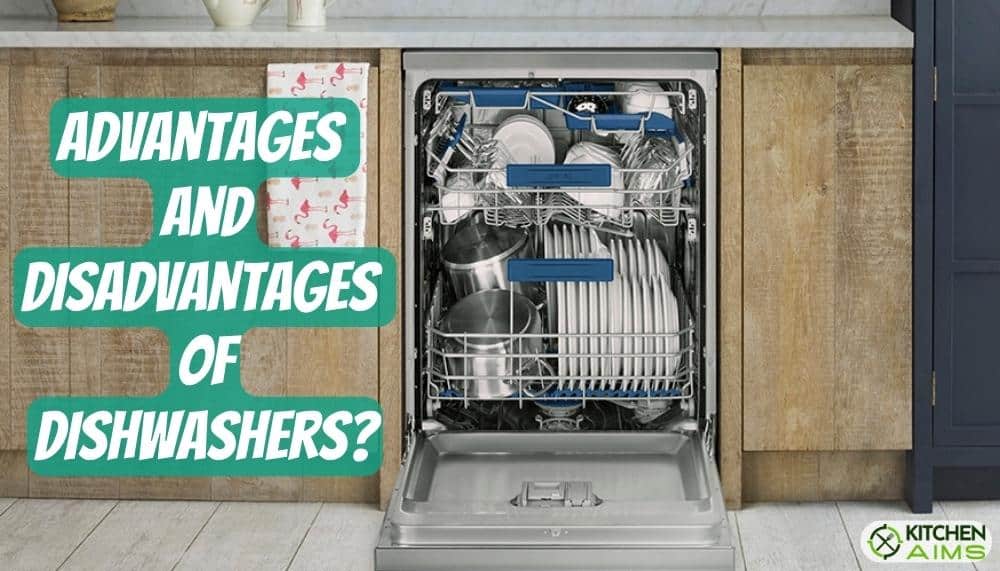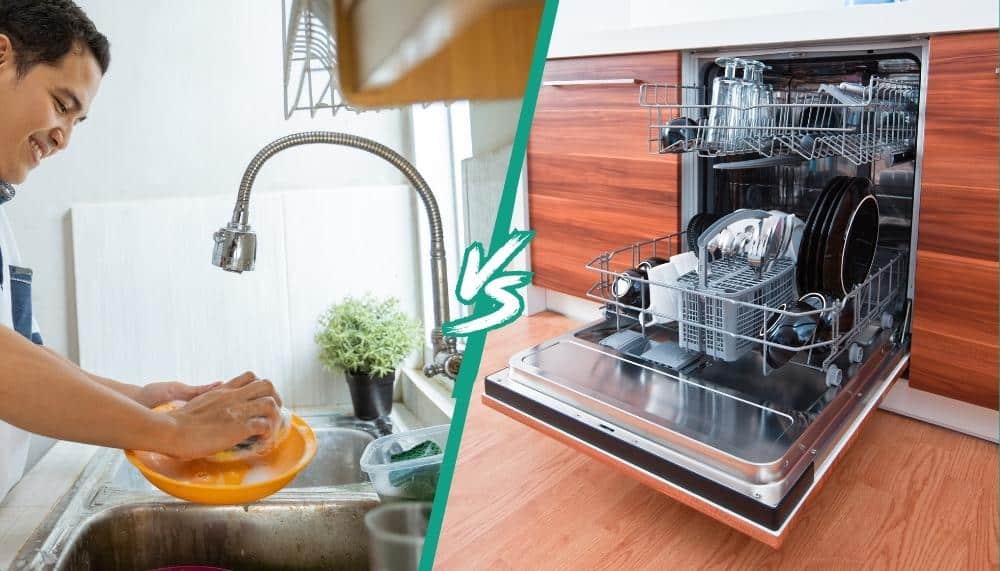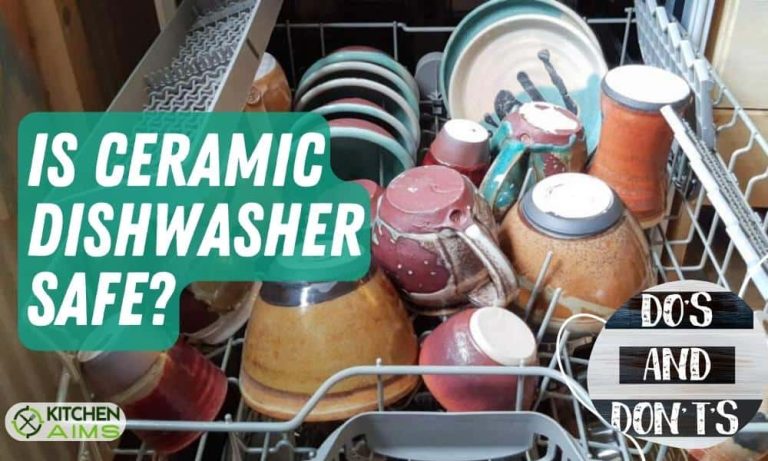Are Dishwashers Worth it? – Weighing the Pros and Cons
Dishwashers are helpful kitchen appliances that combine hot water and detergent with cleaning dishes. It works by taking water from the sink, heating it, adding detergent, and spraying the mixture onto the dishes. The unclean water will be emptied back into your sink after the cycle.
Dishwashers are helpful appliances because they eliminate the need for the user to do the bulk of the dishwashing themselves. They are more efficient than hand washing dishes in terms of both time and water use. You can locate a modern model in a size that works with your kitchen’s design without compromising any of its useful functions.

Contents
What Can You Expect From A Dishwasher?
Having reasonable expectations about a product is important before determining if you want to purchase it. The same item can leave one customer feeling let down while providing exceptional value to another.
Some dishwasher buyers have unrealistic expectations of how their new appliance will make washing dishes feel like a chore. Of course, this is only sometimes the case.
So, let’s talk about dishwashers and what you need to know.
That way, it’s simple to determine if dishwashers are worth the money.
Also Read: Dishwasher not cleaning top rack troubleshoot guide.
Advantages And Disadvantages Of Dishwashers

Advantages Of Dishwashers
Spends Less Time:
Nowadays, the normal family size is 5 people or less per household. Most of the group is busy with work or other activities. As a result, these families often have to sacrifice quality time together to do chores like dishwashing. A dishwasher is an absolute necessity in big homes with lots of dishes. To use a dishwasher, you load it with dirty dishes, choose a cycle, and walk away while it cleans. The most obvious benefit of a dishwasher is the time it saves.
Use it Easily:
Dishwashers are simple to use and only require you to place your dirty dishes inside and turn the machine on. It takes care of everything for you. Moreover, many modern designs have automatic settings and movable shelves for a customised cleaning service. There is no need to scrub or wash each plate by hand because the dishwasher will do it for you.
save water:
Everyday, households worldwide use hundreds of gallons of water to do dishes. Individual households can save a lot of water by using a dishwasher instead of hand-washing dishes. A dishwasher uses five to ten gallons per cycle, while hand-washing can use up to twenty gallons per load. Not only does a dishwasher conserve water, but it also increases efficiency in the kitchen by freeing up time and labour.
The latest models of dishwashers are designed with energy efficiency in mind. They come equipped with specific cycles that use less energy and water than older models.
Electrical Power and Financial Resources:
In the long term, using a dishwasher can save you money by reducing the water you use and the energy required to heat that water. Compared to an Energy Rating dishwasher, which uses as little as 11 liters per load, hand washing dishes in the sink can require up to 102 liters. Although purchasing a dishwasher may seem like a large sum of money at the time, it is more cost-effective in the long run. Once installed, you’d save money on utilities, cleaning supplies, and more.
Complete Sanitization
While you’re more used to seeing sanitising functions on washers, the same reasoning applies to dishwashers. The sanitising cycle of a dishwasher uses higher water heat and a longer wash duration to destroy up to 99 percent of the bacteria left on the dishware after the regular wash cycle.
Dishwasher Safe:
Expensive dinnerware is safe in a dishwasher. There will be no more shattered glasses due to accidental drops or bangs when washing them by hand. Micro-damage caused by sponges and scrubbers shortens the life of the dinnerware. The dishwasher’s water jets are too gentle for the “soft” layer on your plates and kadhais.
No Noise:
The clanging of pans and spoons is an annoying noise. Dishwashers today generate about as much noise as a quiet fan. While everyone is asleep in the evening, you can quickly and conveniently put dishes to be cleaned.
Quick and simple setup and maintenance:
As easy as it is to set up a washing machine, so too is a dishwasher. You may set up the dishwasher yourself by following the directions, but if you need more skills, it is recommended that you contact a professional.
However, some people consider the idea of installing and maintaining a dishwasher to be scary. A dishwasher’s sewage system must be appropriately connected. Thus it’s essential to pay close attention to detail while installing one. Knowing the frequency with which the filter should be cleaned and the kind of cleaning products that should be used is essential for the health of your dishwasher.
Disadvantages of Dishwasher
- You could become bored.
- Regular maintenance is required.
- You could become highly dependent on dishwashers.
- Doing the dishes by hand can be enjoyable.
- A kitchen appliance that takes up too much kitchen space.
Also Read: Are dishwashers hardwired or plugged in?
What Dishwasher Is Suitable For a Single Person?
Many factors, such as price, the dishwasher’s ability to meet your needs, and its portability, should be considered while shopping for a dishwasher for a single person’s household.
Freestanding dishwashers are ideal for a single person unless they regularly cook with many large pots and pans. A portable dishwasher is a preferable option in those circumstances.
A little countertop model like the one Collected from another brand is what you need.
You might have to wait until you have a full load before you can run a full-size dishwasher. This might be a major hassle if you need more serving utensils.
Thankfully, makers have realised that single people only sometimes require full-sized dishwashers. Because of this, numerous manufacturers have created a more manageable size that may be kept on a kitchen counter if you have a modest-sized family.
How Often Should a Dishwasher Run?
The expense of running a dishwasher is directly related to the number of dishes you use per meal. Most people are aware that dishwashers perform best when they are completely loaded. This meant that a single person might only need to run theirs twice a week.
According to most one-person families, it takes roughly three to four days to fill the dishwasher. This is fine if you have a lot of dishes, but most people’s homes don’t.
It’s up to you and your dish load to decide how often you’ll run your countertop dishwasher. Remember that even compact countertop appliances perform better when they’re working hard.
In conclusion, the number of times per week your dishwasher needs to be run will vary depending on how often you clean your dishes.
Again, this won’t help everyone because only some have that many dishes waiting that long between cycles.
Dishwashing Vs. Hand Washing

Either wash the dishes by hand or use a dishwasher, although both are equally common. They both claim to clean your kitchen cookware well, but which one does a better job?
Dishwashers are highly recommended for houses with multiple people who spend a lot of time cooking and cleaning. Dishwashers use high-temperature soapy water to quickly and thoroughly clean your dishes, removing all traces of food and grease. In addition, many modern models include efficiency-boosting options like adjustable timers and power-saving modes.
However, using a dishwasher is an excellent way to save time and effort spent on dishwashing.
Frequently Asked Questions
Final Thoughts
There’s no doubt that a dishwasher is an excellent piece of equipment for a pair of hands to do some work in the kitchen. A dishwasher is superior to a human dishwasher in every way, including being more efficient and requiring less water. A dishwasher is a convenient and inexpensive way to clean dishes quickly and easily without wasting time or energy by hand washing them.
Also, they come in a wide variety of sizes, so there’s no need to worry about limited quarters. Even if you live alone, there are still many situations where a dishwasher might be helpful. Convenience, monetary savings, and time efficiency are among these factors. The number of dishes you have may also factor into the viability of a dishwasher.

Mery Webber
Mery Webber, the founder of Kitchen Aims, is a passionate home cook with extensive experience in the kitchen appliance industry. Through her blog, she aims to share her knowledge and help readers create the perfect kitchen.






